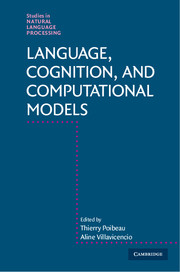Book contents
- Frontmatter
- Contents
- Figures
- Tables
- Contributors
- Part I About This Book
- Part II Models of Neural and Cognitive Processing
- Part III Data Driven Models
- Part IV Social and Language Evolution
- 9 Social Evolution of Public Languages: Between Rousseau's Eden and Hobbes’ Leviathan
- 10 Genetic Biases in Language: Computer Models and Experimental Approaches
- 11 Transparency versus Processing Efficiency: A Case Study on German Declension
- Index
- References
9 - Social Evolution of Public Languages: Between Rousseau's Eden and Hobbes’ Leviathan
from Part IV - Social and Language Evolution
Published online by Cambridge University Press: 30 November 2017
- Frontmatter
- Contents
- Figures
- Tables
- Contributors
- Part I About This Book
- Part II Models of Neural and Cognitive Processing
- Part III Data Driven Models
- Part IV Social and Language Evolution
- 9 Social Evolution of Public Languages: Between Rousseau's Eden and Hobbes’ Leviathan
- 10 Genetic Biases in Language: Computer Models and Experimental Approaches
- 11 Transparency versus Processing Efficiency: A Case Study on German Declension
- Index
- References
Summary
Abstract
In the present study, I argue for a two-step or dual account of language evolution, in which structural features of language (discrete infinity, semanticity, decoupling) evolved as part of a Language of Thought, which was then exapted for communication. At the second step, given the social nature of communication, a social scenario is needed. I first examine and reject two social scenarios: the change in social organization proposed by Dunbar (an increase in group size in modern humans) and the change in prosocial attitudes advocated by Tomasello (where modern humans evolved toward altruism). I settle for a mildly Machiavellian account (between Rousseau and Hobbes), in which language evolved to allow humans to manipulate each other, though the manipulation, while beneficial to the speaker, is not necessarily detrimental to the hearer. A strong clue to the manipulative nature of linguistic communication lies in implicit communication (presupposition and conversational implicature) that allows speakers not only to hide their manipulative intentions but even to deny that they had such intentions.
Introduction
Most accounts of language evolution see it as having evolved for communication. Let us say that such accounts see language as a communication system in the strong sense. These accounts rest on an undeniable and obvious fact: humans in communication routinely use language. The view that language is a communication system in the strong sense, given that communication is the epitome of a social process, has rather understandably led to the idea that language evolution was first and foremost a social phenomenon. Indeed, most extant accounts of language evolution propose “social” scenarios: Számado and Szathmáry (2006) list eleven scenarios (gossip, grooming, group bonding/ ritual, hunting, language as a mental tool, pair bonding, sexual selection, song, status for information, and tool making), only one of which – language as a mental tool – clearly is not “social.” So, there seems to be a fairly large consensus that language is a communication system in the strong sense that it evolved for social reasons. It should be added that the social scenarios enumerated earlier can be divided according to whether they see the social pressure leading to the emergence of language as due to prosocial attitudes (the cooperative/altruistic hypothesis advocated by Tomasello 2009, 2010) or to an arm race motivated by inside group competition and conflict (see Dunbar 1996, 1998). The first are on Rousseau's side, seeing humans as fundamentally altruistic.
- Type
- Chapter
- Information
- Language, Cognition, and Computational Models , pp. 227 - 255Publisher: Cambridge University PressPrint publication year: 2018

